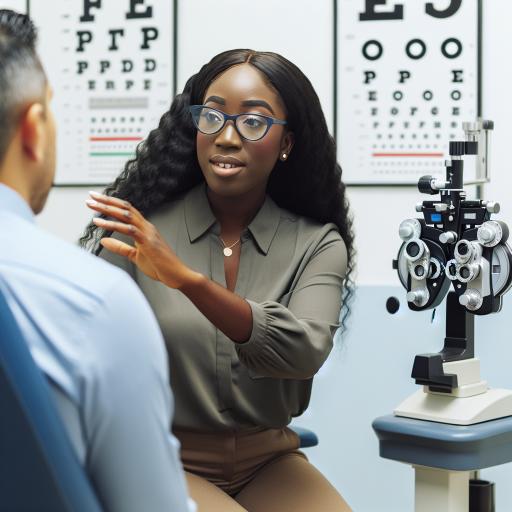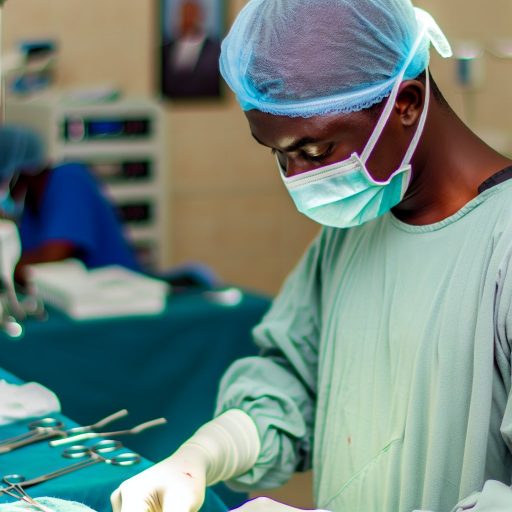Introduction
Medical lab scientists play a vital role in the healthcare system.
They ensure accurate diagnoses and effective treatment plans.
Their work directly impacts patient outcomes and public health.
In Nigeria, medical lab scientists are crucial for monitoring infectious diseases and conducting health research.
They perform essential laboratory tests that guide clinical decisions.
Their expertise helps in disease prevention and management, improving community health overall.
To become a medical lab scientist in Nigeria, you need to follow specific steps.
This process involves education, certification, and gaining practical experience.
Understanding these steps will help aspiring scientists navigate their career path effectively.
First, you must obtain the required educational qualifications.
Enroll in a recognized university that offers a degree in Medical Laboratory Science.
Complete a Bachelor of Science degree in this field, which typically spans four years.
Once you graduate, prepare to take the Professional Examination.
This exam is conducted by the Medical Laboratory Science Council of Nigeria (MLSCN).
Passing this exam is crucial for your certification as a medical lab scientist.
After passing, apply for registration with the MLSCN.
This registration is mandatory to practice legally as a medical lab scientist in Nigeria.
With your registration, you gain credibility and recognition in the field.
Next, seek employment opportunities in hospitals, research institutions, or private labs.
Gaining practical experience is vital for your professional development.
You can also pursue internships to further enhance your skills.
Continuous professional development is essential.
Attend workshops, conferences, and training sessions.
Staying updated with advancements in medical laboratory science will keep your skills relevant.
Basically, following these key steps will set you on the path to becoming a successful medical lab scientist in Nigeria.
Your contributions will significantly impact healthcare, benefitting individuals and the community alike.
Understanding the Role of a Medical Lab Scientist
Definition and Primary Responsibilities
A medical lab scientist plays a critical role in the healthcare system.
They analyze samples collected from patients.
These samples may include blood, urine, or tissue specimens.
Major responsibilities include the following:
- Performing laboratory tests to diagnose diseases.
- Using advanced laboratory equipment and technologies.
- Interpreting and reporting test results accurately.
- Ensuring quality control in laboratory procedures.
- Maintaining laboratory instruments and equipment.
- Adhering to safety protocols and regulations.
- Training and supervising junior lab staff.
- Collaborating with healthcare professionals to inform patient care.
- Conducting research to improve laboratory practices and technologies.
Skills and Competencies Required
Success in the field of medical laboratory science requires specific skills.
These abilities allow professionals to perform their duties effectively.
Key skills include:
- Strong analytical skills to interpret complex data.
- Attention to detail for accurate test results.
- Problem-solving skills to troubleshoot laboratory issues.
- Effective communication skills to collaborate with healthcare teams.
- Technical skills to operate and maintain laboratory equipment.
- Organizational skills for managing multiple samples and tests.
- Critical thinking skills to assess laboratory findings.
- Commitment to adhering to ethical and legal standards.
- Ability to work under pressure in a fast-paced environment.
Importance of Medical Lab Tests
Medical lab tests underpin modern medicine.
They play a crucial role in diagnosing and treating diseases.
Accurate test results guide healthcare decisions that affect patient outcomes.
Here are several ways lab tests impact healthcare:
- They provide critical information for diagnosing conditions.
- Lab tests help monitor disease progression and treatment response.
- They enable early detection of diseases, increasing treatment success.
- Lab data assists in identifying risk factors for diseases.
- They enhance personalized medicine approaches tailored to individual patients.
- Lab findings inform public health decisions and responses.
- They foster research initiatives that drive medical advances.
The analysis done by medical lab scientists is invaluable.
It supports physicians in making informed decisions about patient care.
Without lab technicians’ expertise, many medical advances would not be possible.
The role of a medical lab scientist is both challenging and rewarding.
Professionals contribute significantly to healthcare while continually expanding their knowledge and skills.
Understanding their responsibilities is the first step to entering this vital field.
Educational Requirements
Becoming a medical lab scientist in Nigeria requires a well-defined educational pathway.
You must meet specific academic qualifications before entering this vital healthcare field.
The medical laboratory plays a crucial role in diagnosis and treatment.
Therefore, pursuing the right education is essential for success in this profession.
Overview of Necessary Academic Qualifications
The first step towards becoming a medical lab scientist is obtaining your Senior Secondary School Certificate.
You must complete your secondary education successfully.
This provides a foundation in subjects crucial for your future studies.
Focus on subjects such as:
- Biology
- Chemistry
- Physics
- Mathematics
Achieving good grades in these subjects enhances your chance of admission into a reputable university.
Awareness of the competitive nature of admission processes is vital.
Many universities have limited slots for medical laboratory science programs.
Relevant Undergraduate Programs
Once you have your secondary school certificate, the next step is enrolling in a university.
This typically involves pursuing a Bachelor of Science in Medical Laboratory Science.
Several universities in Nigeria offer this program.
It usually lasts four years.
The curriculum is comprehensive and covers various necessary topics.
During your studies, you will engage in both theoretical and practical learning.
The first two years will primarily focus on foundational courses.
These include:
- Anatomy
- Physiology
- Biochemistry
- Microbiology
In your final years, you will delve deeper into specialized areas of medical laboratory science.
Key areas include:
- Clinical Chemistry
- Hematology
- Immunology
- Parasitology
- Histopathology
Hands-on laboratory training is crucial during your undergraduate studies.
Most universities conduct extensive practical sessions in well-equipped laboratories.
Some institutions even have affiliations with hospitals for clinical practice.
After completing your undergraduate degree, you will qualify for internship programs.
This is a critical step for gaining real-world experience.
Internships typically last for about six months in accredited laboratories.
You will work under the supervision of experienced medical lab scientists.
This exposure is invaluable for your professional development.
Importance of Accreditation by Relevant Bodies
Upon completing your undergraduate program, you need to register with the Medical Laboratory Science Council of Nigeria (MLSCN).
This step is vital for your professional practice.
The MLSCN ensures that laboratory scientists meet the required standards.
It also regulates the practice to maintain quality in healthcare delivery.
Before registration, ensure your university is accredited by the MLSCN.
Studying in an accredited institution guarantees that your degree is recognized.
It also increases your employability in both public and private sectors.
Additionally, registered medical laboratory scientists can work in various settings, including:
- Hospitals
- Clinical laboratories
- Research institutions
- Public health organizations
Staying current with developments in the field is crucial.
Attending workshops and continuing education programs offered by the MLSCN is essential.
This helps you update your skills and knowledge regularly.
Moreover, consider pursuing further studies.
Obtaining a Master’s degree in Medical Laboratory Science can enhance your expertise and career prospects.
Advanced degrees open opportunities for teaching or research positions in academic institutions.
Furthermore, certifications in specialized areas can give you an edge.
Certifications demonstrate your commitment and proficiency in specific fields.
This can include fields like:
- Clinical Microbiology
- Blood Banking
- Molecular Diagnostics
Seek mentorship from experienced professionals as you advance in your medical lab career.
Build a strong network within the community, and join professional associations for valuable resources.
To become a medical lab scientist in Nigeria, start with solid secondary education, then earn a Bachelor of Science in Medical Laboratory Science.
Attend an accredited institution to boost employability and register with the Medical Laboratory Science Council of Nigeria to solidify your professional standing.
Continuously update your skills and pursue further education to enhance career prospects in this dynamic field.
Read: Why Nursing is One of the Most Rewarding Careers in Nigeria
Choosing the Right Institution
When aspiring to become a medical lab scientist in Nigeria, selecting the right institution is vital.
The quality of your education significantly impacts your career.
Therefore, consider multiple factors before making your choice.
Factors to Consider When Selecting a University or Polytechnic in Nigeria
Several important factors can guide your selection process.
Firstly, examine the institution’s accreditation status.
Ensure the school meets the standards set by the National Universities Commission (NUC) or the National Board for Technical Education (NBTE).
Secondly, look into the program curriculum.
A well-structured curriculum should cover theoretical and practical aspects of medical laboratory science.
Check if the program includes essential courses like microbiology, hematology, and biochemistry.
Thirdly, consider the faculty’s qualifications and experience.
Experienced lecturers enhance your learning experience.
Research their areas of specialization and teaching methods to ensure they align with your interests.
Next, investigate the availability of modern laboratory facilities.
A well-equipped lab enhances practical learning.
Ensure the institution invests in necessary equipment and resources.
Furthermore, assess the institution’s student-to-faculty ratio.
Smaller class sizes often lead to better interaction and personalized attention.
This setting fosters a deeper understanding of subjects.
Additionally, review graduate employability rates.
Institutions with strong connections to healthcare facilities often yield better job placements.
Check statistics and alumni testimonials to gauge success rates.
Consider the location of the institution as well.
Proximity to hospitals and clinics can offer valuable practical experience.
Additionally, factor in living costs in that region.
Finally, the overall reputation of the institution significantly matters.
Research the institution’s ranking within Nigeria.
Institutions known for excellence in medical programs tend to provide better education quality.
List of Reputable Institutions Offering Medical Laboratory Science Programs
Choosing the right institution involves knowing which schools offer strong programs.
Here are some reputable universities and polytechnics that provide medical laboratory science courses:
- University of Lagos (UNILAG)
- Obafemi Awolowo University (OAU)
- University of Ibadan (UI)
- Ahmadu Bello University (ABU)
- University of Nigeria, Nsukka (UNN)
- Nnamdi Azikiwe University (UNIZIK)
- Federal University of Technology, Owerri (FUTO)
- Imo State University (IMSU)
- Lagos State University (LASU)
- Rufus Giwa Polytechnic (RUGIPO)
- Yaba College of Technology (YABATECH)
- Ibarapa Polytechnic, Eruwa
- Auchi Polytechnic, Auchi
These institutions enjoy a good reputation and offer robust programs.
Always research their curriculum and facilities for more detailed insights.
Importance of Visiting Campuses or Attending Open Days
Visiting campuses or attending open days is crucial for informed decision-making.
This process allows you to observe facilities firsthand.
You can evaluate the laboratory equipment and other resources available to students.
Additionally, campus visits provide opportunities to meet current students and faculty.
Engaging with them can yield valuable insights into their experiences.
This firsthand knowledge helps you assess the institution’s culture and environment.
Open days often allow prospective students to attend introductory lectures.
This exposure demonstrates teaching styles and class dynamics and helps you envision your learning experience.
Take note of how professors interact with students during these sessions.
Moreover, campus visits increase your understanding of extracurricular activities offered.
Getting involved in clubs and organizations can enhance your educational experience.
Pursuing such activities contributes to your personal and professional development.
Lastly, campus visits can aid in establishing a sense of belonging.
Assessing the campus atmosphere helps you determine if it aligns with your values and expectations.
Finding an environment where you feel comfortable is key to a successful academic journey.
In fact, choosing the right institution is a fundamental step in becoming a medical lab scientist in Nigeria.
Consider accreditation, program curriculum, and faculty qualifications when making your decision.
Review the reputation and resources of potential institutions.
Lastly, visiting campuses or attending open days can greatly inform your choice.
Follow these steps to set a solid foundation for your future profession.
Read: Everything You Need to Know About Becoming a Radiographer in Nigeria

Gaining Practical Experience
Gaining practical experience is a crucial step in becoming a medical lab scientist in Nigeria.
It enhances your theoretical knowledge and equips you with the skills needed in the field.
Through internships and placements, you can acquire hands-on experience that most employers value highly.
Internships and Placements During Academic Program
Internships and placements are essential components of medical laboratory science programs in Nigeria.
Most tertiary institutions require students to complete these practical experiences before graduation.
This requirement serves several purposes:
- Application of Theoretical Knowledge: Internships allow you to apply what you have learned in the classroom.
- Exposure to Lab Equipment: You gain firsthand experience with different laboratory equipment and technologies used in diagnostics.
- Understanding Laboratory Protocols: You learn about laboratory safety protocols and standard operating procedures.
- Real-World Problem-Solving: Practical placements challenge you to solve real clinical problems, enhancing critical thinking skills.
Many institutions facilitate the process of securing internships for their students.
They often have partnerships with hospitals, clinics, and diagnostic laboratories.
Therefore, students should actively seek these opportunities early in their programs.
A proactive approach increases the likelihood of securing a suitable placement.
Importance of Hands-on Training in Clinical Settings
Hands-on training in clinical settings is vital for your successful career as a medical lab scientist.
Here are key reasons why this experience is essential:
- Skill Acquisition: Practical training enables you to master essential skills like sample collection, analysis, and reporting.
- Networking Opportunities: You meet professionals in the field who can offer guidance and job referrals in the future.
- Understanding Workplace Dynamics: Exposure to a clinical environment helps you learn about teamwork and communication among healthcare providers.
- Confidence Building: Working in a lab setting builds your confidence in handling real clinical situations.
- Job Readiness: Employers often seek candidates with practical experience, making you more competitive in the job market.
The importance of practical experience cannot be overstated.
This training shapes your skills and prepares you for the challenges of a medical lab environment.
Consequently, your time in internship settings will determine your future success as a lab scientist.
Steps to Securing Internships
Successfully securing an internship requires careful planning and commitment.
Below are actionable steps to help you find and land a suitable internship in medical laboratory science:
- Research Available Opportunities: Begin by researching hospitals, clinics, and diagnostic laboratories near you.
Many organizations welcome interns to help offset their workload. - Utilize University Resources: Speak to your academic advisors and professors about internship placements.
They often have connections in the industry. - Network with Professionals: Attend seminars, workshops, and conferences in the medical field to meet lab scientists and professionals.
Networking can lead to valuable internship opportunities. - Prepare a Professional CV: Create a well-structured CV that highlights your academic achievements and relevant skills.
Tailor your CV for each application. - Write an Engaging Cover Letter: Craft a compelling cover letter, showcasing your enthusiasm for the field.
Mention why you are interested in the specific laboratory or hospital. - Follow Up on Applications: After submitting your applications, follow up with a polite email to express continued interest.
This demonstrates initiative and helps keep your application on their radar. - Prepare for Interviews: If invited for an interview, prepare thoroughly.
Research the institution and be ready to discuss your strengths and motivations.
By following these steps, you can effectively secure internships that will greatly enhance your academic and professional journey.
Remember that each internship experience will cumulatively build your skill set and resume.
Building Professional Connections in the Field
Building a network of professional connections is critical for your career as a medical lab scientist.
Connections can lead to mentorship and even job opportunities.
Take the following actions to foster these connections:
- Engage with Faculty: Maintain relationships with your professors.
They can provide insights and recommendations. - Join Professional Associations: Become a member of relevant professional associations, such as the Association of Medical Laboratory Scientists of Nigeria (AMLSN).
- Participate in Community Outreach: Volunteer in community health programs or health camps, where you can interact with healthcare professionals.
- Utilize Social Media: Use platforms like LinkedIn to connect with professionals in the field.
Share your achievements and engage in discussions. - Attend Workshops and Conferences: Participate in events related to laboratory science.
These create valuable networking experiences.
By continuously seeking to expand your professional network, you position yourself for career opportunities in the medical laboratory science field.
Strong connections can lead to job offers and mentorship, guiding your career advancement.
In general, gaining practical experience through internships and placements is a vital step toward becoming a proficient medical lab scientist in Nigeria.
Through hands-on training, you not only sharpen your technical skills but also build a network that can significantly influence your career trajectory.
By actively pursuing internship opportunities and fostering professional connections, you set yourself on a path to success in this rewarding field.
Read: Must-Know Healthcare Professions Thriving in Nigeria
Obtaining Professional Certification
In Nigeria, obtaining professional certification is essential for aspiring medical lab scientists.
This certification validates your qualifications and enhances your career prospects in the healthcare industry.
The Medical Laboratory Science Council of Nigeria (MLSCN) is the regulatory body responsible for this certification process.
Certification Process with the Medical Laboratory Science Council of Nigeria
To become a certified medical lab scientist, you must follow a structured process set forth by the MLSCN.
Below is an outline of the steps involved in obtaining certification:
Eligibility Requirements
- You must possess a degree in medical laboratory science from a recognized institution.
- Your academic program must have been accredited by the MLSCN.
- Additionally, you should have completed a mandatory internship or practical training period.
Application for Examination
- After meeting eligibility requirements, submit your application for the certification examination.
- Gather all necessary documents, including your degree certificate and internship completion letter.
- Pay the required examination fee to complete the application process.
Examination Scheduling
- The MLSCN will schedule examinations twice yearly, usually in June and December.
- You will receive notification of the exam dates and locations after your application is processed.
Preparation for the Examination
- Preparing for the certification examination is crucial for success.
- Review the MLSCN examination syllabus to understand the topics covered.
- Join study groups or forums to engage with fellow candidates.
- Utilize past examination papers for practice and time management.
- Consider enrolling in preparatory courses at accredited institutions.
Taking the Examination
- The examination typically consists of both theory and practical sections.
- Be punctual on the examination day; latecomers may not be allowed to enter.
- Pay attention to instructions and manage your time wisely during the exam.
Results and Certification
- MLSCN will release examination results within a few weeks after the exam.
- If you pass, you will receive a certificate validating your status as a medical lab scientist.
- If you do not pass, you can retake the examination in the next sitting.
Examination Requirements and Preparation Tips
Understanding the examination requirements is key to successful certification.
Review the following important points:
- Exam Structure: The examination includes multiple-choice questions, short answers, and practical assessments.
- Topics Covered: Core subjects include microbiology, hematology, biochemistry, and immunology.
- Knowledge of Laboratory Techniques: Be familiar with laboratory protocols, equipment, and safety measures.
Here are some effective preparation tips:
- Study regularly instead of cramming information at the last minute.
- Use textbooks, lecture notes, and online resources to reinforce your learning.
- Form study groups with peers to discuss difficult topics.
- Consult with mentors or instructors for guidance on complex subjects.
- Take care of your physical and mental health by resting and exercising before the exam.
Importance of Certification in Enhancing Job Prospects and Professional Credibility
Obtaining certification significantly influences your career as a medical lab scientist.
Here’s how certification can enhance job prospects:
- Increased Employability: Most healthcare institutions require certification for laboratory personnel.
- Professional Recognition: Certification showcases your commitment to the profession and adherence to industry standards.
- Higher Salary Potential: Certified professionals often receive better salaries compared to their non-certified counterparts.
Moreover, professional credibility enhances your chances for job advancement:
- Promotion Opportunities: Certified individuals are frequently considered for supervisory or managerial roles.
- Networking: Certification allows you to connect with other professionals in the field for collaborations or mentorship.
- Continuous Professional Development: Certification bodies encourage ongoing education, ensuring you remain current in advancements.
In essence, obtaining professional certification is a vital step for aspiring medical lab scientists in Nigeria.
Following the outlined certification process and adequately preparing for the examination will significantly enhance your career prospects.
Remember, a certification not only improves job opportunities but also builds your professional credibility in the medical field.
Read: Comparison: Physician Assistants vs Doctors in Nigeria
Continuing Education and Professional Development
In the dynamic field of medical laboratory science, pursuing continuing education is crucial.
This commitment ensures that professionals remain competitive and effective in their roles.
It also helps laboratory scientists adapt to the rapid technological advancements in healthcare.
Ongoing Education: Why It Matters
Ongoing education is essential for several reasons:
- Enhancement of Skills: Continuous learning improves your technical and analytical skills.
- Professional Certification: Many employers require certification renewal every few years.
- Networking Opportunities: Education platforms allow you to connect with other professionals in the field.
- Career Advancement: Further education increases your chances for promotions and leadership roles.
- Adaptation to New Technologies: Regular training helps you stay current with new lab equipment and procedures.
Specialization Options
Medical laboratory scientists can choose various specialization areas to enhance their career prospects.
Here are some popular options:
- Clinical Chemistry: Focus on chemical analysis of bodily fluids.
- Microbiology: Study of microorganisms in patient samples.
- Histotechnology: Involves preparing tissue samples for microscopic examination.
- Molecular Diagnostics: Techniques to analyze DNA and RNA for disease detection.
- Blood Banking: Ensuring the safety and compatibility of blood transfusions.
Choosing a specialization allows you to develop in-depth expertise in a specific area.
This, in turn, can lead to greater job satisfaction and opportunities for advancement.
Professional Development Opportunities
Engaging in workshops and conferences is vital for professional growth.
These events provide invaluable knowledge and networking opportunities.
Here are some ways to seek professional development:
- Workshops: Participate in practical hands-on training to learn about new techniques.
- Conferences: Attend national and international conferences to hear from experts.
- Webinars: Join online educational sessions for convenience and flexibility.
- CME Programs: Consider continuing medical education programs to earn credits.
- Membership in Professional Organizations: Join organizations like the Association of Medical Laboratory Scientists in Nigeria (AMLSN) for resources and networking.
Importance of Staying Updated
The field of laboratory science evolves rapidly.
It is crucial to stay updated about the latest advances in the industry.
Here are some reasons why this is important:
- Improved Patient Care: Staying informed ensures the delivery of the best possible care.
- Adoption of New Technologies: Awareness of innovations promotes the efficient use of new technologies.
- Compliance with Regulations: Keeping up with current guidelines helps maintain regulatory compliance.
- Enhanced Safety Practices: Updated knowledge about safety protocols protects both staff and patients.
- Research Contributions: Engaging with current literature allows for participation in research and evidence-based practice.
Staying updated requires commitment and proactive engagement.
Following these steps can greatly enhance your professional development journey.
Strategies for Effective Continuing Education
Implementing effective strategies for continuing education can boost your learning experience.
Here are some strategic steps:
- Set Learning Goals: Clearly outline your short-term and long-term learning objectives.
- Balance Work and Education: Find a manageable schedule that allows you to balance both commitments.
- Seek Mentorship: Connect with experienced professionals who can guide your development.
- Utilize Online Resources: Access online courses, journals, and forums to enhance your knowledge.
- Collaborate with Peers: Engage in study groups or discussions with colleagues to deepen understanding.
In a nutshell, continuing education and professional development are fundamental in becoming a successful medical lab scientist in Nigeria.
The importance of staying informed cannot be overstated.
Opportunities for specialization and professional growth abound, allowing you to develop a fulfilling career.
Remember to pursue lifelong learning actively and engage with peers in the profession.
By doing so, you will ensure not only your professional success but also contribute positively to the healthcare landscape in Nigeria.
Career Opportunities and Job Market
Overview of Potential Career Paths
Medical lab scientists have various career paths they can pursue in Nigeria.
Many professionals choose to work in hospitals, clinics, or private laboratories.
Others may find rewarding careers in research institutions or public health organizations.
The following outlines key career opportunities:
- Hospital Laboratory Scientist: Work in hospitals conducting tests and analyzing specimens.
- Clinical Laboratory Technician: Perform routine lab procedures and assist in diagnosis.
- Research Scientist: Conduct studies to enhance methodologies in laboratory science.
- Public Health Analyst: Engage in epidemiological studies to prevent diseases.
- Quality Control Officer: Oversee laboratory standards and ensure compliance with regulations.
- Medical Sales Representative: Promote laboratory equipment and diagnostic products to healthcare facilities.
- Educator or Trainer: Teach aspiring medical lab scientists in academic institutions.
Job Market Landscape
The job market for medical lab scientists in Nigeria is robust and growing.
Increased health awareness and rising healthcare needs drive demand in this field.
Government initiatives and private investments in health sectors further boost opportunities.
Key factors contributing to a positive job outlook include:
- Growing Population: An expanding population increases the need for health services.
- Emphasis on Preventative Care: Increased focus on early detection of diseases enhances the role of lab scientists.
- Technological Advancements: New technologies create new testing methods, requiring skilled professionals.
- Public Health Initiatives: Government programs aimed at disease prevention create more jobs.
- International Standards: Labs are investing in better practices to meet global standards, necessitating trained staff.
Despite the positive landscape, competition remains fierce.
Many graduates enter the job market annually, so standing out is critical.
Candidates must showcase their skills and experiences effectively.
The availability of internships and practical training enhances employability.
Thus, prospective medical lab scientists should take these aspects seriously.
Tips for Job Hunting
Finding a job as a medical lab scientist requires strategic planning and networking.
Follow these practical tips to increase your chances:
- Update Your CV: Ensure your CV reflects your skills, education, and experiences relevant to the job.
- Tailor Applications: Customize your application for every job you pursue, emphasizing relevant skills.
- Utilize Online Job Portals: Websites like Jobberman, MyJobMag, and Hot Nigerian Jobs list numerous opportunities.
- Network Effectively: Attend conferences, workshops, and seminars to connect with industry professionals.
- Engage on Social Media: Use platforms like LinkedIn to build your professional network and showcase achievements.
- Join Professional Associations: Organizations such as the Association of Medical Laboratory Scientists of Nigeria (AMLSN) offer networking opportunities.
- Volunteer or Intern: Gain experience through internships or volunteer roles to improve your skills and network.
Leveraging Professional Associations
Joining professional associations plays a pivotal role in career advancement.
These organizations provide several benefits:
- Continuing Education: Access to workshops, seminars, and courses helps keep skills current.
- Networking Opportunities: Connect with fellow professionals, potential employers, and mentors.
- Job Boards: Many associations maintain job boards where you can find exclusive positions.
- Advocacy: Professional groups advocate for the interests of lab scientists and promote the profession.
- Research Collaborations: Collaborate on research projects to gain recognition and expand your experience.
Medical lab scientists play a crucial role in the healthcare system of Nigeria.
The career paths available are diverse and promising.
As the demand for skilled professionals continues to rise, aspiring medical lab scientists must remain proactive in their job search.
Following the tips outlined above can significantly enhance your chances of securing a position in this rewarding field.
By leveraging professional associations and continually advancing your skills, you can thrive in your medical laboratory career.
Conclusion
Becoming a medical lab scientist in Nigeria involves several clear steps.
First, you need to understand the educational requirements.
Pursuing a relevant bachelor’s degree forms the foundation of your career.
Focus on programs in medical laboratory science or related fields.
Next, consider gaining hands-on experience. Internships provide practical knowledge and skills.
They also give you a competitive edge when applying for jobs.
Furthermore, seek accreditation from the appropriate regulatory bodies.
This ensures you meet the standards required to practice.
After obtaining your degree and accreditation, prepare for the job market.
Update your resume and apply for positions widely.
Network with professionals in the field to open more opportunities.
Attending conferences and workshops can enhance your connections.
Keep in mind the importance of continuous education as well.
Engage in professional development to stay updated on advancements.
Being current in your knowledge will serve you well in your career.
For aspiring students, pursuing a career as a medical lab scientist is rewarding.
Not only do you contribute to diagnosing diseases, but you also improve patient outcomes.
Your expertise plays a critical role in public health initiatives.
Lastly, reflect on the impact you can make as a medical lab scientist.
Your work supports healthcare professionals and communities.
By ensuring accurate diagnostic services, you help protect lives and improve overall health systems.
Embrace this fulfilling journey with passion and commitment.




